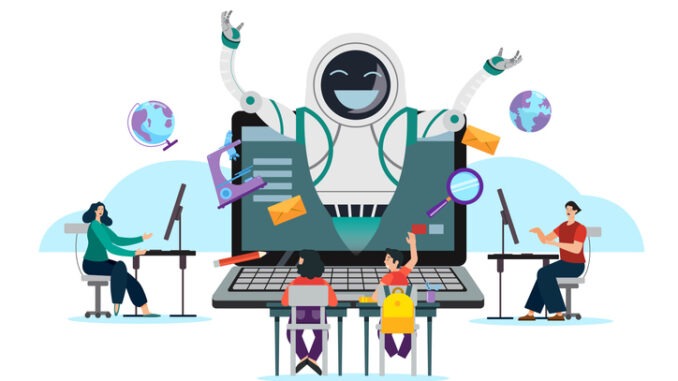Delve into the exciting possibilities of AI in education as we explore how the recent Education AI Hackathon is paving the way for AI solutions to alleviate teacher workloads, providing a glimpse into the future of education technology
CREDIT: This is an edited version of an article that originally appeared on DfE
In October, the vibrant world of education witnessed a dynamic convergence of minds as school business leaders from across England embarked on an exhilarating artificial intelligence (AI) hackathon. This two-day event set the stage for SBLs to explore the wonders of technology and decipher how AI could be the driving force behind a revolution in education.
AI: Transforming education
Artificial intelligence has already made significant strides in reshaping society. It contributes to economic growth and the delivery of enhanced public services. In the realm of education, AI holds vast potential, from providing invaluable support to teachers in their administrative tasks to offering personalised feedback to students on their coursework.
To unlock the possibilities AI holds for education, the Department for Education joined hands with Faculty AI, the National Institute of Teaching, and the AI in Schools Initiative. This collaborative effort came to life in the form of an AI hackathon hosted in the bustling city of London. The event brought together teachers and leaders from schools and trusts across England, including prominent names like Harris Federation, Star Academies, Outwood Grange Academies Trust, and Inspiration Trust.
Exploring AI’s capabilities
The participants in this endeavour embarked on a journey to explore the boundless potential of AI in education. They delved into various scenarios, such as whether AI could craft a comprehensive lesson plan or accurately evaluate exam papers.
The most promising solutions will be shared with the department’s workload reduction taskforce, and demos of these innovative tools will be made available for schools across the country. This initiative aligns with the government’s vision of reducing working hours for teachers and leaders by five hours per week, thereby improving their work-life balance.
Words from leaders
Education Secretary, Gillian Keegan, expressed her optimism for AI’s potential to transform education. She highlighted AI’s capacity to provide personalised support for students and to alleviate the burdens of teacher workload. Keegan emphasised the importance of understanding how AI functions safely, paving the way for a brighter future in education.
Secretary of State for Science, Innovation, and Technology, Michelle Donelan, echoed these sentiments. She underlined the role of AI in streamlining administrative tasks and planning for teachers, allowing them to focus on what truly matters: nurturing students. The government is also taking a proactive approach by equipping the next generation with AI skills through conversion courses, ensuring they thrive in the ever-evolving workplace.
Tom Nixon, Director of Government at Faculty AI, stressed that AI is the defining technology of our generation, with the power to streamline processes and enhance education. He emphasised the importance of transitioning from rhetoric to reality, ensuring these transformative tools find their way into classrooms.
Dr. Calum Davey, Executive Director of Research at the National Institute of Teaching, discussed the necessity of developing solutions that align with the needs and challenges of schools. This partnership between AI technology experts and educators aims to bridge the gap, thereby ensuring the technology is practical and valuable.
Leading the way in AI
The United Kingdom is already a global leader in AI, championing its safe and responsible development. Ahead of the UK AI Safety Summit, this collaborative effort stands as a testament to the country’s commitment to remaining at the forefront of AI innovation.
In its pursuit of AI’s potential in education, the Department for Education launched a call for evidence in June, seeking insights from educational professionals on the risks, ethical considerations, and opportunities AI presents in education. The results of this call for evidence, alongside the outcomes of the recent hackathons, will guide the government’s efforts to harness AI’s potential in a safe, ethical, and equitable manner.
As school business leaders look towards the future, the AI hackathon represents a vital step in understanding the transformative potential of AI in education, offering the promise of lighter workloads for educators and a pathway to more efficient and technology-driven learning environments.




Be the first to comment